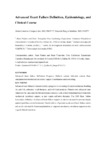Advanced heart failure: definition, epidemiology, and clinical course

Ver/
Use este enlace para citar
http://hdl.handle.net/2183/30277
A non ser que se indique outra cousa, a licenza do ítem descríbese como Creative Commons Attribution-NonCommercial-NoDerivatives 4.0 International License (CC-BY-NC-ND 4.0)
Coleccións
- INIBIC-ICATC - Artigos [177]
Metadatos
Mostrar o rexistro completo do ítemTítulo
Advanced heart failure: definition, epidemiology, and clinical courseData
2021-07-15Cita bibliográfica
Crespo-Leiro MG, Barge-Caballero E. Advanced heart failure: definition, epidemiology, and clinical course. Heart Fail Clin. 2021;17(4):533-545
Resumo
[Abstract] Advanced heart failure (HF) is characterized by a progressive worsening of symptoms disabling for daily life, refractory to all therapies, and with high mortality. These patients may be candidates for life-prolonging therapies, such as heart transplantation (HT) or long-term (LT) mechanical circulatory support (MCS) or must just require palliative therapies. The 1-year survival after HT and/or LT-MCS is approaching 80% to 90%, being patient selection and timely referral to advanced HF centers critical for optimal outcomes. There is no single symptom, sign, or test that can identify these patients and different classifications are complementary and helpful for clinical decision-making.
Palabras chave
Advanced heart failure
Coordination and networking
Definition
Heart transplantation
Mechanical circulatory support
Prognosis
Referral criteria
Selection criteria
Coordination and networking
Definition
Heart transplantation
Mechanical circulatory support
Prognosis
Referral criteria
Selection criteria
Versión do editor
Dereitos
Creative Commons Attribution-NonCommercial-NoDerivatives 4.0 International License (CC-BY-NC-ND 4.0)
ISSN
1551-7136






